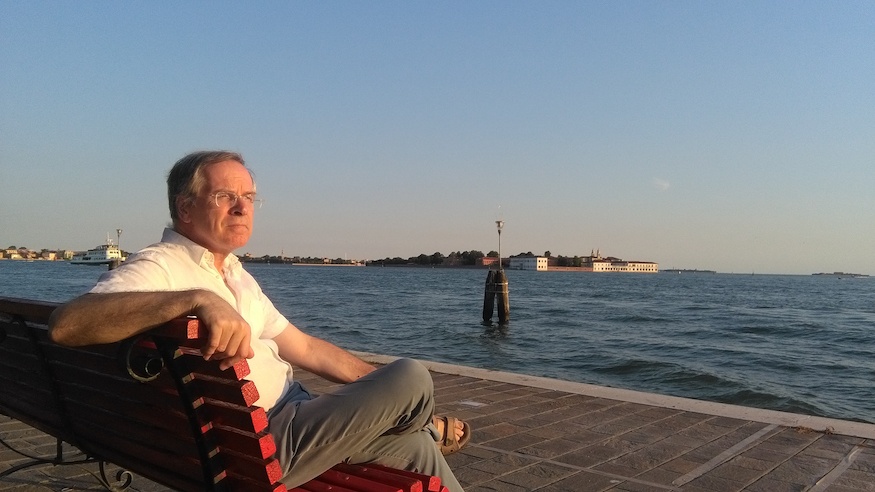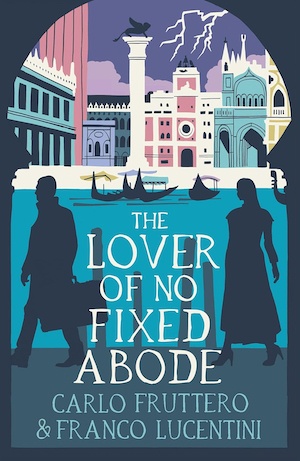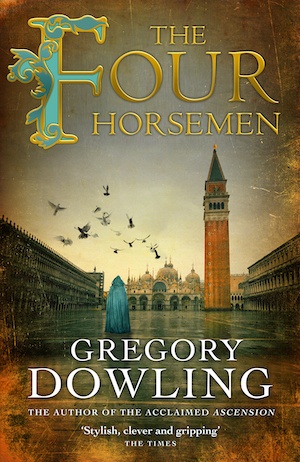
January 2024 will see the publication in English of The Lover of No Fixed Abode, a novel originally written by Carlo Fruttero and Franco Lucentini in 1986, which is set in Venice. With the authors are no longer available for interview, we decided to talk to the book’s translator, Gregory Dowling. Originally from Bristol, he has lived in Venice since 1981 teaching and translating. He’s currently Associate Professor of American Literature at the city’s Ca’ Foscari University.
The Lover of No Fixed Abode is unusual – in fact, it’s probably unlike any other crime novel you’ve read recently. With a tone that gently shifts like the Venetian tides, it will float you away to a world of beautiful art, galleries and operas, romance and history, and… of course… mystery! Here’s what Gregory had to say about translating the book, and his other endeavours in crime fiction…
You can order The Lover of No Fixed Abode here on Amazon.
What are crime fiction lovers going to love about The Lover of No Fixed Abode?
The artful structure of the novel; the build-up towards the final discovery of the truth; the aura of mystery around the central character. And the brilliant use of the setting.
Can you tell us about the two main characters and why they’re interesting?
The main character, Mr Silvera, is a tour-guide, who seems good at his job – highly experienced at least – but curiously out of place; there is clearly some mystery behind his present role and behaviour. The heroine, who is also the narrator of much of the novel, is a sophisticated art-dealer from Roman high society; she is witty, observant, at times a little caustic – and she finds herself falling head over heels in love quite to her surprise.

What’s the situation they find themselves in?
The essential mystery is the identity of Mr Silvera – and his role. This is what intrigues the heroine – and what she sets out to uncover. Is he on the run? Is he a secret agent for the Mossad? How does he know so many different languages? There is also an intriguing sub-plot to do with chicanery in the art world.
The setting is Venice – what role does it play and how is it conveyed in the text?
Venice is the other main character in the novel. The authors are not Venetian but clearly know the city very well and capture it in all its aspects – its beauty, its mystery, its history, its romance – and its often comic reality.
What was it like for you translating the work and what did you find most engaging about it?
It was a challenging work to translate, since Fruttero and Lucentini enjoy moving in and out of different registers – from wittily colloquial to highly literary, with occasional elements of parody. Their descriptive passages occasionally had me reaching for the dictionary, always to find that their word choice, though esoteric, was beautifully apt. Some of the wordplay was difficult to capture, without resorting to footnotes, which in any case would slow down the fun. I hope I’ve done them justice. I certainly enjoyed doing it.
The authors are an interesting pair – can you tell us more about them?
They were a well-known literary duo for several decades, until Franco Lucentini died in 2002. Apart from their novels, they collaborated on numerous projects, such as journalism, literary essays, translations (from English and French), and anthologies. They were particularly important in introducing science fiction to Italy; for 20 years they directed the influential Urania series for Mondadori.
They are now best known for their novels; their first two were published in the 1970s and were set in Turin, where they both lived, although Lucentini was originally from Rome. They were both successfully transferred to the screen (the first as a film, the second as a television series), with Marcello Mastroianni playing the protagonist, a Roman policeman who feels out of place in Turin. They then wrote a crime novel set in Siena, against the colourful background of the city’s annual horse-race; this will come out from Bitter Lemon Press next year, again in my translation.
The Lover of No Fixed Abode was their fourth novel. Their fifth, The D Case, was a rather odd venture, recounting a conference in which a number of fictional detectives come to Rome to discuss Dickens’s last unfinished novel, The Mystery of Edwin Drood. Their last novel was a more traditional crime story set in a pine forest on the coast of Tuscany; this was published in English in my translation in the 1990s.
This story was originally published in 1986. Does it feel historical today or does it have themes that resonate with contemporary life in Italy?
It is certainly a period piece in some ways. No mobile phones, no internet, obviously. But the novel already shows us a Venice at risk of being swamped by over-tourism. And deception and trickery are never out of date.
Franco Lucentini has passed, but did you work with Carlo Fruttero at all in the translation?
Actually, both writers are dead. Lucentini died in 2002 and Fruttero in 2012. But the fact is I translated this novel back in the 1990s, when it was going to be published by Chatto & Windus. They had published two other Fruttero and Lucentini novels that I had translated, but for some reason they hadn’t proved particularly successful, despite being best-sellers in both Germany and France, and so they decided to shelve The Lover of No Fixed Abode.
In my opinion they should have started with this one and things would have gone very differently. In any case, when I did the translation all those years ago Fruttero and Lucentini went through it page by page. There was no Internet then and so I sat in Lucentini’s smoke-filled study while they read it, occasionally questioning a word-choice. It was a little unnerving at first but in the end I was very grateful for their careful attention; they caught a few slips where I had misunderstood some special nuance – and they accepted some of my word choices after I had explained them. They both had a good grasp of written English. I don’t know what their spoken English was like since we always talked in Italian.
Do you read much crime fiction yourself, and if so, what do you recommend, in particular Italian crime fiction?
I do read a fair amount of crime fiction. My favourites among the classics include Wilkie Collins, John Dickson Carr, Michael Innes, Raymond Chandler. Coming to the present day, I’ll limit myself here to Italian authors – and a few non-Italians who have written Italy- and Venice-based novels. I would recommend Gianrico Carofiglio, who is an ex-magistrate and so knows the world he describes very well. Andrea Camilleri is usually reliable for a good story – although I sometimes have to ask my wife, whose mother was Sicilian, for help with the dialect words.

Coming to Venice, there is a wonderful series of novels by Roberto Tiraboschi set in the 12th century, which are remarkable not only for their well-documented settings and atmosphere but also for their gripping plots. Unfortunately, only the first two of the four books have been translated into English – beautifully so, by Katherine Gregor. I’ve just started reading a series of novels set in contemporary Venice by Michele Catozzi; thoroughly Venetian, with a good deal of local dialect; I don’t think they’ve been translated into English yet but should be. And then there’s a trio of English crime fiction writers who know Italy very well and who are friends: Philip Gwynne Jones, with a series set in Venice, with his British vice-consul detective, Nathan Sutherland who is a narrator with a nice vein of ironic wit; Tom Benjamin, who has a series set in Bologna, which he describes very effectively, again through the eyes of an English narrator-protagonist; and David Hewson, who has set novels in Rome and Venice and elsewhere. I have particularly enjoyed David’s last two Venetian novels, more light-hearted than much of his earlier fiction, The Medici Murders and The Borgia Portrait. As the titles suggest, there’s a good deal of history behind these books. I also thoroughly recommend his novel set in World War II Venice, Garden of Angels.
What’s next for you?
I wrote two spy-stories set in 18th-century Venice a few years back (Ascension, 2015; The Four Horsemen, 2017), and I need to get back to them. I have ideas for my hero, Alvise Marangon, and I’m happy to say people have been pressing me for news about a new Alvise novel. I hope to get commissions for more translations as well. Apart from crime fiction I’d very much like to translate some plays by Goldoni, Venice’s 18th-century playwright. Reading his plays – and the memoirs of Casanova – were very helpful when I was trying to get a sense of everyday life in 18th-century Venice. And, not least of all, Goldoni is very funny.
You can order The Lover of No Fixed Abode here on Amazon. Using our associate and affiliate links helps support our site.









Yes please, more translations by Greg of Italian thriller writers! And as one of the people who’ve been at him to write another Alvise Marangon novel, it can’t happen soon enough! ☘️